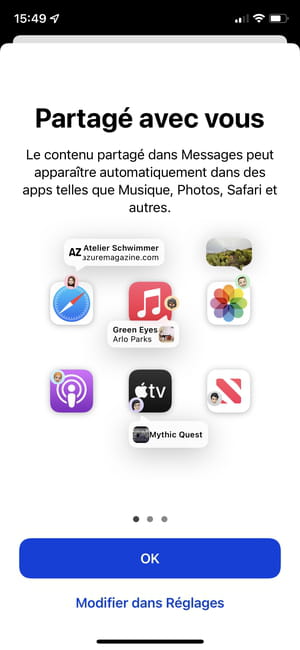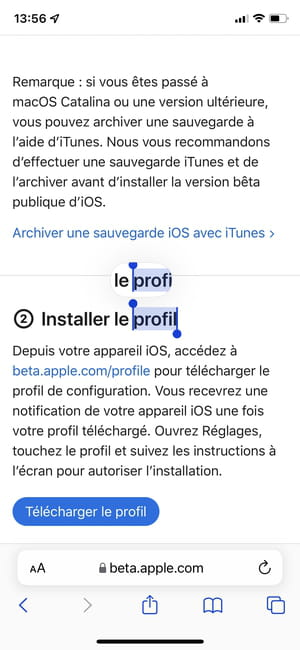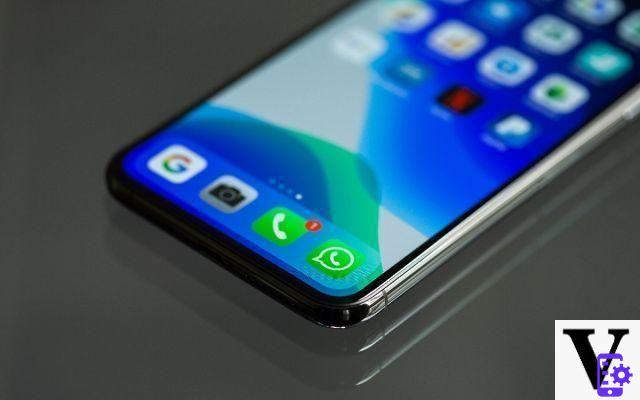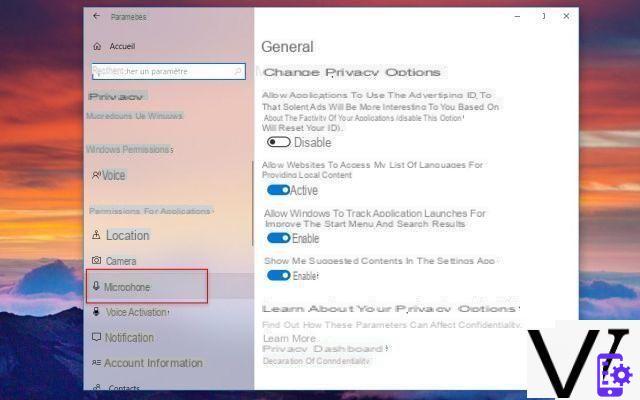After two urgently released updates, Apple is finally deploying a complete and stable version of iOS 15. On the program, bug fixes, but also expected new features such as the SharePlay function.
Everything comes at the right time for those who know how to wait… After a rushed release and two emergency updates to correct bugs, Apple finally offers a stable and complete version of iOS 15, its operating system for iPhone, and its variation for iPad, iPad OS 15. iOS 15.1, which began to be deployed Monday, October 25 in the evening, in parallel with macOS Monterey (see our article) and watchOS 8.1. It was about time because some users were starting to get impatient with the bugs caused by the first version, especially since once iOS 15 is installed on an iPhone, it is no longer possible to go back to an old version of the system! Apple has indeed removed this option to block jailbreaking, a technique that involves unlocking an iPhone to take full control. But iOS 15.1 does not only solve these problems of youth: this update also brings promised new features, such as the SharePlay function, which had been dreaming of some since its announcement.

What is new in iOS 15.1?
We had already discovered the main features of iOS 15 during the WWDC, the developer conference, on June 7 - they are also officially presented on the Apple site. Most were integrated into the first version, the 15.0, released with the iPhone 13 presented at the end of September. But some were still missing. A gap filled with version 15.1 deployed gradually deployed since October 25.
SharePlay: content sharing made easy
It was undoubtedly one of the most anticipated new features of iOS 15. But which finally arrives with version 15.1. SharePlay - literally shared play - is a function for sharing content in real time. During FaceTime or FaceTime Audio calls, a new button allows real-time sharing of an iPhone screen with a correspondent, for example to show photos, a web page or an application, which is already appreciable, but not fundamentally original. Where SharePlay stands out is through the synchronized sharing of audio and video content. During a FaceTime conversation, it is thus possible to listen to music or watch a movie or series with the people you are talking to. So, when you play a music track in Apple Music or a video on AppleTV + during a call, iOS lets you enjoy it with several people at the same time. All participants hear and watch the same thing, they can pause playback, and as soon as someone speaks, the volume automatically lowers. In theory, SharePlay can work with all the services that want it but, for the moment, only Apple applications (Music, TV +, Fitness +) are compatible. We can imagine that Netflix, Amazon Prime Video, Disney + or Spotify will also want to take advantage of this user-friendly function.
Audio: spatial and lossless sound
Spatialization of sound is all the rage - with the aim of offering an “immersive sound experience” as marketers and “communicators” say of all stripes… Apple is no exception to this trend and has integrated audio space in its services, products and some of its applications. Provided you have compatible equipment - AirPods Pro or AirPods 3 wireless headphones, for example - and appropriate audio files - as some that Apple Music offers -, it is thus possible to enjoy a real 3D effect, with its sound emanating from different points in space. If spatial audio was handled as standard, iOS 15.1 leaves the possibility of deactivating the head tracking function which could be annoying or even annoying in certain situations - in transport, in particular. Still in the audio register, iOS 15.1 enables lossless playback - a compressed audio format, but lossless and therefore of better quality, like the Flac - Apple's HomePod speakers with their update to 15.1, instead 256 kbit / s AAC format to which they were limited.
Photo and video: high-end functions reserved for iPhone 13 and 13 Pro
The official presentation of the iPhone 13 and 13 Pro at the keynote on September 14 allowed Apple to lift the veil on new photo and video functions taking advantage of the new capabilities of the new models. Cinematic mode, for example, allows iPhone 13s to independently choose which area to focus on when shooting characters. If the one in the foreground looks away, the iPhone will focus on the character or the setting behind them on its own. Like in a cinema movie. An HDR 4 mode will allow you to take pictures with balanced lighting even in the most delicate light situations, with strong backlighting for example. You can also choose photographic styles during photo or video shooting to accentuate details or colors in real time. And on both iPhone 13 Pro, you'll be able to take macro shots as you get as close as 2cm to your subject. The iPhone 13 Pro are also the only ones able to film in the ProRes format, very popular with video professionals, even if details are lacking on the real capabilities of the device, as the ProRes format is so multiple and complex. However, this format was not available in versions 15.0, 15.0.1 and 15.0.2: it is now present in update 15.1. Please note, the files in ProRes are 30 times larger than with the HEVC format! In addition, on the iPhone 13 Pro in 128 GB, the ProRes is limited to Full HD (1080p) definition at 30 frames per second, with 4K only available for models with more storage. Finally, note that with iOS 15.1, it is possible to disable automatic macro mode on the iPhone 13 Pro.
Safari: a new interface for the web browser
Apple's web browser interface has been revamped to make it easier to use with one hand, even on larger iPhones. By default, the address bar is now at the bottom of the screen, just above the toolbar. And the virtual keyboard fits in between when you need it to go to a new site. The management of tabs has also been completely revised. When you press the double-square button to the right of the toolbar, the various pages open in Safari are clearly tiled in thumbnail views. Even more, to switch between tabs, you don't even have to go through these thumbnails - just place your finger on the address bar and swipe sideways to switch between tab to another. Likewise, you can switch between apps by sliding your finger sideways on the bottom edge of your iPhone screen without a button. And for those who open a lot of websites at the same time, the Tab Groups function allows you to create collections by theme, for example, to open all the pages of a group at the same time with a simple tap on the name of the group.

On the interface side, Safari also allows websites to change the color of the top area of the screen (where the time and the battery charge icon are located). This allows you to customize the iPhone in the colors of the site you are visiting, but it's a bit confusing. An option in iPhone Settings allows you to disable this option, as well as bringing the address bar back to the top of the screen if you prefer.
Messages: better presented and more easily shared content
Message rhymes with sharing. The iPhone Messages app makes sharing between you and your callers even easier. If, for example, one of them sends you several images in an SMS / iMessage, they are now presented in a fan like a deck of cards that you hold in your hand. Just slide your finger sideways across the photos to scroll through them to see them all. And of course, one tap is enough to display them in full screen.

In addition to photos, Messages automatically recognizes the type of content shared with you (a web link, a song, a podcast, etc.) and displays them neatly to you in the conversation stream. But iOS 15 goes further by adding to all the applications concerned (Safari, Music, Podcasts, etc.) a section called Shared with you to easily find an item that someone has sent you. We understand that, for the moment at least, this function is reserved for the Apple universe.

FaceTime: video calls even with those who don't have an iPhone
When Steve Jobs first announced FaceTime in June 2010, he assured that the technology would be shared, so that the whole world could use Apple's video conferencing technology, and not just iPhone and iPad owners. or Mac. Unfortunately, this never happened for base patent management reasons. But iOS 15 circumvents the problem by now allowing to invite correspondents to join you in a Facetime call from their Internet browser, even from a Windows or Linux PC. A revolution, no? Finally, let's say rather progress, knowing that Zoom or Teams or finally any other video solution has allowed it for years ...

Mail: better protect your privacy thanks to Private Relay
It is more on the side of online services than the application itself for managing emails that we must look for new features. As long as you use Apple's e-mail service, you can create a different address for each online account, for example, to avoid giving them your personal address. As for your personal address, you can configure it to use your own domain name, rather than the traditional "@ icloud.com".
Passwords: an independent and complete manager
Still on the confidentiality side and the protection of your privacy, iOS 15 finally includes a complete password manager, compatible with the two-step validation function. As a reminder, this function allows you to scan a QR code so that the password manager then generates a one-time code that changes every thirty seconds. Many sites use this very effective double authentication method to protect your account. Everything can now be managed from your iPhone and synchronized with your iPad and your Mac, via the Keychain integrated into all Apple systems. To use without moderation.

Concentration: a new high-boosted do not disturb mode
The iPhone is so useful that it is used all the time, and sometimes too much. In order not to be interrupted without stopping by a call, the arrival of a message or any other notification, iOS already offered the Do not disturb mode which allowed the iPhone to receive all this information, but without alerting you. . In iOS 15, Do Not Disturb Mode is replaced by Focus, which allows you to schedule different ways to filter your notifications based on your activities and times of the day. You can also ask iPhone to defer notifications so they can all be received at a specific time of day.

Plans: more detailed maps and staggered routes
As with each new version, the Maps application offers increasingly detailed maps, the level of detail of which differs depending on the location. Which means you may have to wait before your city is covered. But, for some of them, an ultra precise 3D visualization awaits you. In terms of detail, which changes everything, you can now also request the staggered calculation of a route, and not just for an immediate departure. Convenient to plan for departure traffic jams on vacation!

Many practical everyday tips
In addition to all of the big new things discussed above, iOS 15 is also loaded with small improvements. We note for example the return, finally, of the selection magnifier. So when you put your finger on a text to select part of it, a mini-window is displayed above your finger to allow you to see what you are doing. This essential function had disappeared since iOS 13, we wonder why!

Function Live Text now allows you to similarly select words included in a photo you just took or in any photo in your photo library. The iPhone is responsible for analyzing each image to allow you, for example, to extract a phone number or the content of a panel that you have just taken a picture. Bluffing! Please note, this function is only available for recent iPhones, i.e. XS and later (iPhone 11, 12 and 13). Even if all the standard iPhone applications have been revised, we particularly appreciate the new graphical finishes of the Weather application. We almost want it to rain just to see the animation of the water drops on the rest of the interface!
Finally, among the other novelties of iOS 15.1, let us quote the creation of HomeKit automations according to the temperature of an accessory, the possibility for Siri to say the name of the caller during a phone call, the integration of the vaccination record and health pass in the iOS portfolio and the correction of some bugs.
Which iPhones are compatible with iOS 15?
We can say that Apple has really made efforts in this area, since we can install on all iPhone capable of hosting iOS 14. And the oldest of these, the iPhone 6S, dates from September 2021 ! Even if all the new functions of iOS 15 are not necessarily available on the oldest models, we appreciate being able to benefit from the latest updates, especially in terms of security, to make your iPhone last as long as possible. This helps not to give in to the sirens of renewing your smartphone too often. Especially since it is often enough to offer it a new battery to give it a new lease of life! Here, therefore, all the models that will be able to receive iOS 15.
- iPhone 13, iPhone 13 mini, iPhone 13 Pro et iPhone 13 Pro Max
- iPhone 12, iPhone 12 mini, iPhone 12 Pro et iPhone 12 Pro Max
- iPhone 11, iPhone 11 Pro et iPhone 11 Pro Max
- iPhone X, iPhone XR, iPhone XS et iPhone XS Max
- iPhone 8 and iPhone 8 Plus
- iPhone 7 and iPhone 7 Plus
- iPhone 6S and 6S Plus
- iPhone SE 1st and 2nd generation
- iPod Touch 7th generation
Which iPads are compatible with iPadOS 15?
Obviously, the mobile operating system for Apple tablets is evolving at the same rate as the version for phones and, like iOS, iPadOS went into version 15 final as of September 20. And iPadOS 15.1 arrived on October 25, like iOS 15.1. True to form, the Apple brand has not forgotten its former users and the update is available for many models, some dating back to 2021, although the older ones will be excluded from the evolution. Here is the official list of tablets that can upgrade to iPadOS 15.1.
- Pad mini 4, 5 and 6 (2021, 2021 and 2021)
- iPad Air 2, 3 and 4
- iPad 5, 6, 7, 8 and 9 (2021, 2021, 2021, 2021 and 2021)
- iPad Pro all versions (2021, 2021, 2021, 2021, 2021)
How do I install the iOS 15.1 update?
As usual, updating your iPhone to iOS 15.1 is very easy via iPhone settings, in the General section, then Software update. To have all the details on the installation procedure, consult our practical sheet which details all the steps step by step, and not only for the versions 15. The last version, the 15.1, being available since October 25, you will be able to launch download and installation now, to take advantage of the new system functions after about twenty minutes. If you are not in a hurry - it is sometimes prudent to wait for others to wipe the plasters of a major version… -, wait a few days or weeks: the update will be offered automatically and you can install iOS 15.1 or a more serenely corrected revision. Note that, as always, the update is free: logical, its cost is included in the price of the device and its development is an integral part of the Apple ecosystem.
What were the bugs in iOS 15?
Just days after its arrival with fanfare on September 20, iOS 15 was already singled out for its flaws. Nothing dramatic, however, at first. Jose Rodriguez, a security researcher, had revealed on Twitter that a critical flaw allowed you to access notes taken on an iPhone without even having to unlock it, simply by going through Siri. In addition, users had noticed that their connected objects (Mac, keys, etc.) disappeared for no apparent reason from the Find My application. Funny detail, the bug also concerns the AirTag, the famous little Apple beacons, designed precisely to find lost personal effects ... More annoying, an error message indicating that the storage of the device was full was displayed in such a way unwanted on some iPhones and iPads when there was still free space. In short, fairly classic little flaws of youth.
But things got worse over the days and the list of bugs identified has grown even longer. For example, users complain that the pictures of a conversation in Messages disappear from their library even though they had saved them. In a completely different area, the voice assistant Siri comes up against requests related to simple actions, such as sending an email or consulting phone calls. And on the iPhone 13, the new benchmark smartphone, the touchscreen of some models reacts badly to iOS 15 and CarPlay crashes when you start playing music with Apple Music or another audio application. Another problem, still on new models with iOS 15: it is not possible to unlock the iPhone from the Apple Watch. Funnier: on some iPhone 13s, a notification prompts you to install iOS, causing an endless loop.
In short, a nice collection of little hiccups that disappointed Apple, and which only confirmed a universal piece of advice: never rush for an update!
What does the iOS 15.1 update fix?
To rectify the situation, Apple urgently released a version 15.0.1 for iOS - and for iPadOS, which suffered from the same problems. Published on October 1, however, this update only fixed some of the iOS 15 bugs. In particular, the one that prevents unlocking an iPhone 13 with the Apple Watch. So much the better for the happy processors of this new smartphone and an Apple connected watch, but they only represent a small proportion of users of iOS 15, which works on a large number of models, even relatively old ones. On the other hand, the other long-awaited fix was the bug indicating that the storage is full, even when there is still free space. Phew! A relief for all those who saw their storage fill up over the days for no apparent reason.
This version has been superseded by another update, numbered 15.0.2, released on Monday, October 11. According to the details provided by Apple, it fixes five problems: the bug which led to the deletion of library photos saved from the Messages application after deleting the conversation or associated message; the bug that made AirTags invisible in the Objects tab of the Locate application; the bug which prevented card holders with MagSafe from connecting to the Finder application, the bug which caused the restoration or the update of the iPhone 13 or the iPad mini 6 to crash with the Finder or iTunes; and the CarPlay bug that could not open audio apps or disconnect while playing. It is always that taken!
Since October 25, all these youth issues have been resolved with version 15.1. But it's still too early to tell if this update is completely bug-free ...
We strongly recommend that you download this update immediately - which still weighs over 600 MB - to replace iOS 15, iOS 15.0.1 or iOS 15.0.2. The manipulation is carried out, as usual, by opening the Settings device and going to the section Software update (see above for detailed explanations).
Do I need to update to iOS 15.1 and iPadOS 15.1?
Given the problems encountered with the first version of iOS 15, we can legitimately ask the question of updating to iOS 15.1. In fact, it all depends on what version of the system you are currently using, especially compared to 17/8. Indeed, a few days before the release of iOS 15, Apple had urgently released version 14.8 which fixed several important security flaws, in particular those which had allowed the famous Pegasus spyware to be installed surreptitiously on the phones of several personalities. worldwide (see our article iOS 14.8 macOS 11.6: fixes for the Pegasus vulnerability). Of course, these vulnerabilities are also corrected in versions 15.x. This version 14.8 is stable, but it does not include any functional novelty compared to the previous one.
- If you have installed iOS 15.0, 15.0.1, or 15.0.2, don't wait and install iOS 15.1 immediately.
- If you have a version earlier than 14.8, update to iOS 15.1.
- If you have iOS 14.8 and if the new features of iOS 15 are not essential for you, wait a bit, to be sure that the new version does not cause new problems. In fact, during massive deployments of new versions, it is common to see bugs appear, as soon as the system is confronted with very many devices, as is the case for the first version of iOS 15. In In general, these various faults are corrected using the betas which circulated previously and which are used precisely to detect problems, to correct them in the final version. But some bugs sometimes escape this testing phase. Also, if you are not curious, or if you do not have an imperative need for the new functions, you can perfectly wait, while all the reported problems are corrected.
Everything comes at the right time for those who know how to wait… After a rushed release and two emergency updates to correct bugs, Apple finally offers a stable and complete version of iOS 15, its operating system for iPhone, and its ...


























